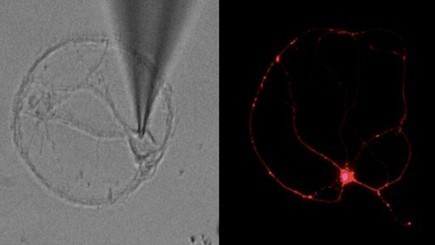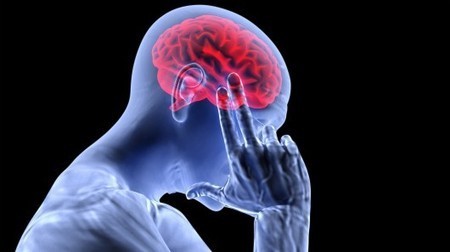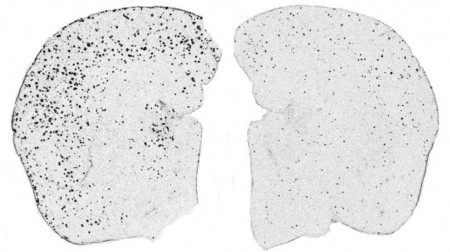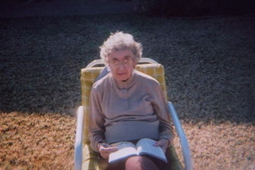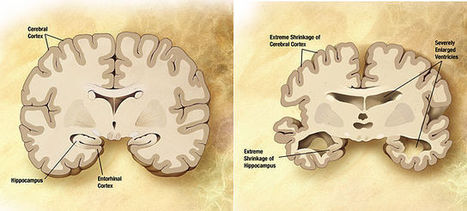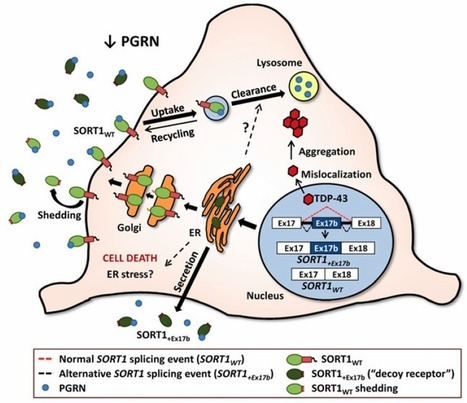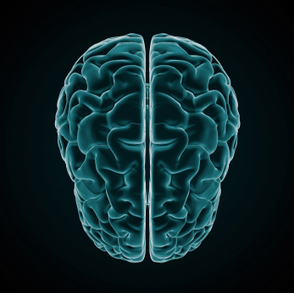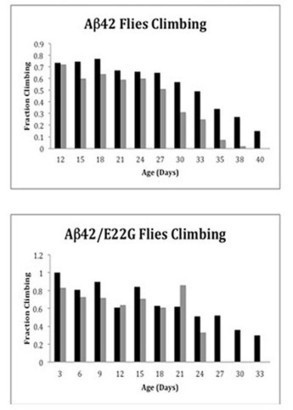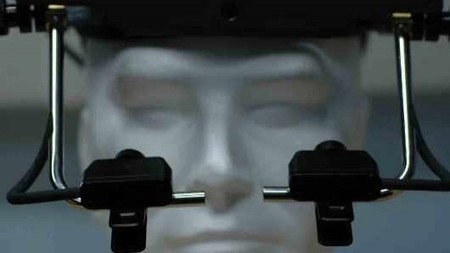 Your new post is loading...
 Your new post is loading...
The first experimental drug to boost brain synapses lost in Alzheimer’s disease has been developed by researchers at Sanford-Burnham. The drug, called NitroMemantine, combines two FDA-approved medicines to stop the destructive cascade of changes in the brain that destroys the connections between neurons, leading to memory loss and cognitive decline.
Although no one is announcing a cure for Alzheimer’s disease just yet, research recently conducted at the University of Southern California does at least offer a glimmer of hope. Using drugs known as TSPO (translocator protein) ligands, scientists there have successfully halted and even reversed the effects of Alzheimer’s in mice. The mice, all of which were male, had been genetically engineered to develop the disease. The drugs were tested on both 7-month-old young adult mice and 24-month-old elderly mice. Because the TSPO ligands increase production of steroid hormones, it was important that the animals’ existing testosterone levels be kept low before beginning the treatment. While this had already occurred naturally with the older mice as a result of aging, the younger ones had to be castrated in order to bring their levels down.
Most of us are able to let other people know that we’re stressed, simply by telling them. For people such as those suffering from Alzheimer’s, however, it can be difficult to express such a thought. That’s why UK scientists at Loughborough University and Imperial College London are developing a new test that can determine someone’s stress levels by analyzing their breath.
A new drug designed to prevent the early stages of Alzheimer’s disease could enter clinical trials in a few years’ time, according to scientists.
Alzheimer’s disease begins when a protein called amyloid-β (Aβ) starts to clump together in senile plaques in the brain, damaging nerve cells and leading to memory loss and confusion.
A way to stimulate the brain’s natural defense mechanisms in people with Alzheimer’s disease has been discovered by researchers at Université Laval, CHU de Québec and pharmaceutical firm GlaxoSmithKline (GSK): a molecule known as MPL (monophosphoryl lipid A) that stimulates the activity of the brain’s immune cells.
The breakthrough opens the door to developing a treatment for Alzheimer’s disease and a vaccine to prevent the illness.
Scientists at VTT Technical Research Centre in Finland have developed new software called PredictAD that could significantly boost the early diagnosis of Alzheimer's disease. The comparative software contrasts patient’s measurements with those of other patients kept in large databases, then visualizes the status of the patient with an index and graphics. The support system and imaging methods were developed by VTT and Imperial College London. The researchers used material compiled in the U.S. by the Alzheimer’s Disease Neuroimaging Initiative based on the records of 288 patients with memory problems. Nearly half of them, or 140 individuals, were diagnosed with Alzheimer’s disease on average 21 months after the initial measurements, which is about the same as the current European average of 20 months.
Researchers are investigating the use of pacemaker-like devices for the treatment of Alzheimer’s disease.
Earlier this year, researchers identified the intracellular mechanisms regulated by vitamin D3 that may help the body clear the brain of amyloid beta, the main component of plaques associated with Alzheimer's disease. Published in the March 6 issue of the Journal of Alzheimer's Disease, the early findings show that vitamin D3 may activate key genes and cellular signaling networks to help stimulate the immune system to clear the amyloid-beta protein. Previous laboratory work by the team demonstrated that specific types of immune cells in Alzheimer's patients may respond to therapy with vitamin D3 and curcumin, a chemical found in turmeric spice, by stimulating the innate immune system to clear amyloid beta. But the researchers didn't know how it worked.
By turning off an immune system transmitter in mice with an Alzheimer’s-like condition, scientists have been able to greatly reduce the accumulation of an abnormal protein known as amyloid-ß in the animals’ brains. Previous studies have shown that the protein plays a central role in Alzheimer’s disease. It is hoped that the research may ultimately point the way towards a method of preventing or treating the disease in humans.
A new study suggests that physical activity may mitigate cognitive decline in older adults. Men who were inactive displayed the greatest atrophy (brain shrinkage). Contrary to common understanding, social and intellectual activity did not appear to affect shrinkage according to this study.
Mayo Clinic study in seniors finds that diets high in sugars and starches promote brain fog and dementia. Correlations between carb intake and brain fog included: *Those with the highest carbohydrate intake relative to total fat and protein intake were 3.6 times likelier to develop MCI.
High dietary intake of vitamin D has been associated with a lower risk of developing Alzheimer's disease among older women, according to a new...
"Confirmation that dementia starts decades before symptoms.Pathophysiology May Help ID Rare, Early Form of Alzheimer's."
Via Brian Shields
|
Humans are living longer, but for many, longevity doesn’t equal quality of life. Increasingly, the final years are marked by a steady cognitive decline where memory and personality are swallowed in dementia. Alzheimer’s disease (AD) is on the rise, and there is no treatment. Worse, researchers and drug companies wrestling with the disease seem to have hit a wall. Most recently, Baxter announced its Alzheimer’s treatment, Gammagard, proved ineffective at its twin goals of reducing cognitive decline and preserving cognitive abilities in a 490-patient Phase III trial. Although the trial showed some positive results in participants genetically predisposed to the disease, Baxter will discontinue current immunoglobulin studies in Alzheimer’s.
Screening levels of vitamin E in the blood could help to improve the diagnosis of Alzheimer’s Disease, according to new research that suggests the vitamin may also aid in protection.
The number of U.S. residents aged 65 and older living with Alzheimer's disease is expected to nearly triple to 13.8 million by 2050 as aging baby boomers swell the ranks of those living with the brain-wasting disease, U.S. researchers said on Wednesday.
New research in the FASEB Journal by NIH scientists suggests that a small molecule called TFP5 rescues plaques and tangles by blocking an overactive brain signal, thereby restoring memory in mice with Alzheimer’s — without obvious toxic side effects. “We hope that clinical trial studies in AD patients yield an extended and a better quality of life, as observed in mice upon TFP5 treatment,” said Harish C. Pant, Ph.D., a senior researcher involved in the work from the Laboratory of Neurochemistry at the National Institute of Neurological Disorders at Stroke at the National Institutes of Health.
Researchers at Mayo Clinic in Florida have uncovered a toxic cellular process by which a protein that maintains the health of neurons becomes deficient and can lead to dementia.
The findings shed new light on the link between culprits implicated in two devastating neurological diseases: Alzheimer’s disease and amyotrophic lateral sclerosis, also known as Lou Gehrig’s disease, which afflicts physicist Stephen Hawking.
There is no cure for frontotemporal dementia, a disorder that affects personality, behavior and language and is second only to Alzheimer’s disease as the most common form of early-onset dementia.
Researchers at Johns Hopkins Medicine have surgically implanted a pacemaker-like device into the brain of a patient in the early stages of Alzheimer’s disease, the first such operation in the United States. The device, which provides deep brain stimulation and has been used in thousands of people with Parkinson’s disease, is seen as a possible means of boosting memory and reversing cognitive decline.
An efficient, high-volume technique for testing potential drug treatments for Alzheimer's disease uncovered an organic compound that restored motor function and longevity to fruit flies with the disease, according to new research that could help...
Via LeapMind
In neurodegenerative diseases, the choroid plexus and CPECs age prematurely, resulting in reduced CSF formation and decreased ability to flush out the plaque-forming proteins that are a hallmark of Alzheimer’s. Transplant studies have provided proof of concept for CPEC-based therapies. However, such therapies have been hindered by the inability to expand or generate CPECs in culture. “Our method is promising, because for the first time we can use stem cells to create large amounts of these epithelial cells, which could be utilized in different ways to treat neurodegenerative diseases,” said Monuki, an associate professor of pathology & laboratory medicine and developmental & cell biology at UCI.
The latest data from a long-running study of hormone therapy suggests women who started taking hormone replacements within five years of menopause were 30 percent less likely to develop Alzheimer's disease than women who started years later.
As researchers look for better ways to diagnose Alzheimer’s disease in its early stages, one promising detection methodology to emerge is a simple eye tracking procedure developed by scientists at Lancaster University in conjunction with Royal Preston Hospital. The results of such tests can help flag initial signs of memory impairment that are associated with the onset of the disease.
Researchers compared vitamin E levels in Alzheimer's, mild cognitive impairment, and cognitively normal subjects. Individuals with cognitive impairment or Alzheimer's had lower blood levels of vitamin E. The study concluded that both disorders were associated with increased vitamin E damage. Low plasma tocopherols and tocotrienols levels are associated with increased odds of MCI and AD. Neurobiol Aging. 2012 Oct;33(10):2282-90. Epub 2011 Dec 20.
http://www.neurobiologyofaging.org/article/PIIS0197458011004982/abstract
|



 Your new post is loading...
Your new post is loading...

